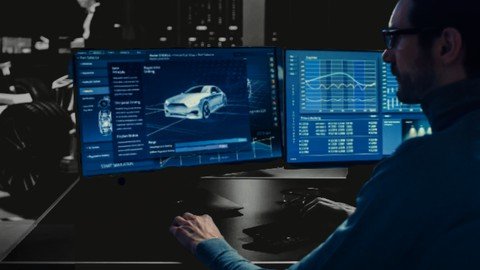Ai For Engineering Applications A-Z
Author: fullsoftcrack on 2-04-2023, 06:48, Views: 81

Free Download Ai For Engineering Applications: A-Z
Published 4/2023
MP4 | Video: h264, 1280x720 | Audio: AAC, 44.1 KHz
Language: English | Size: 16.47 GB | Duration: 12h 3m
AI For Engineering Applications: A-Z
Free Download What you'll learn
Understand the needed AI for Engineering Applications
How to Code an Optimize model from scratch
How to Code a K-Means Clustering from scratch
How to Code a Q table Reinforcement Learning Engine from Scratch
Use Google Or-Tools to optimize a plant scheduling problem.
Use OpenAI baselines library to solve a control problem.
Use Keras to construct a U-net neural network to segment (outline) a crack on a surface.
Predict machine failure using real aircraft engine data.
Requirements
High School Maths
Basic Python knowledge
Description
DescriptionThis is a complete course that will prepare you to use Machine Learning in Engineering Applications from A to Z. We will cover the fundamentals of Machine Learning and its applications in Engineering Companies, focusing on 4 types of machine learning: Optimization, Structured data, Reinforcement Learning, and Machine Vision.What skills will you Learn:In this course, you will learn the following skills:Understand the math behind Machine Learning Algorithms.Write and build Machine Learning Algorithms from scratch.Preprocess data for Images, Reinforcement learning, structured data, and optimization.Analyze data to extract valuable insights.Use opensource libraries to apply Machine Learning to the different types of machine learning.We will cover:Fundamentals of Optimization and building optimization algorithms from scratch.Use Google OR Tools optimization library/solver to solve Shop job problems.Fundamentals of Structured Data processing algorithms and building data clustering using K-Nearest Neighbors algorithms from scratch.Use scikit-learn library along with others to predict the Remaining Useful Life of Aircraft Engines (Predictive maintenance).Fundamentals of Reinforcement Learning and building Q-Table algorithms from scratch.Use Keras & Stable baselines libraries to control room temperature and construct a custom-made Environment using OpenAI Gym.Fundamentals of Deep Learning and Networks used in deep learning for machine vision inspection.The use of TensorFlow/ Keras to construct Deep Neural Networks and process images for Classification using CNN (images that have cracks and images that do not) and crack Detection and segmentation using U-Net (outline the crack location in every crack image).If you do not have prior experience in Machine Learning or Computational Engineering, that's no problem. This course is complete and concise, covering the fundamentals of Machine Learning followed by using real data with strong opensource libraries needed to apply AI in Companies. Let's work together to fulfill the need of companies to apply Machine Learning in Engineering applications to MAKE OUR FUTURE ENGINEERING PRODUCTS SMARTER.
Overview
Section 1: Introduction
Lecture 1 Introduction
Lecture 2 Course Structure
Lecture 3 Common AI Applications in Engineering Companies
Lecture 4 Course Requirements
Lecture 5 Installing Anaconda
Section 2: Optimization
Lecture 6 General Optimization Techniques
Lecture 7 Greedy Randomized Adaptive Search Procedure (GRASP)
Lecture 8 GRASP Coding_1: Imports, Data input
Lecture 9 GRASP Coding_2: Cost, Seed Functions
Lecture 10 GRASP Coding_3: Ranking Function
Lecture 11 GRASP Coding_4: Local Search
Lecture 12 GRASP Coding_5_PartA: Restricted Candidate List (RCL)
Lecture 13 GRASP Coding_5_PartB: Restricted Candidate List (RCL)
Lecture 14 GRASP Coding_6: Main Iteration
Lecture 15 Job Shop Problem
Lecture 16 Integer Linear Programming
Lecture 17 Job Shop Cooding_1_set_needed_data
Lecture 18 Job Shop Cooding_2_set_variables
Lecture 19 Job Shop Cooding_3_set_constraints
Lecture 20 Job Shop Cooding_4_set_objective
Lecture 21 Job Shop Cooding_5_solve_results
Section 3: Structured Data
Lecture 22 Supervised and Unsupervised Machine Learning
Lecture 23 K-means Clustering
Lecture 24 K-means Clustering Coding_1_import_libraries
Lecture 25 K-means Clustering Coding_2_Data_Preprocessing
Lecture 26 K-means Clustering Coding_3_Calculate_Distance
Lecture 27 K-means Clustering Coding_4_Centroid_Initialization
Lecture 28 K-means Clustering Coding_5_Main_Loop
Lecture 29 K-means Clustering Coding_6_Results_Assessment
Lecture 30 Predictive Maintenance 1: Download the Data
Lecture 31 Predictive Maintenance 2: Understand the General Data
Lecture 32 Predictive Maintenance 3: Data Exploration
Lecture 33 Predictive Maintenance 4: Data Arrangement
Lecture 34 Predictive Maintenance 5: Data Preparation
Lecture 35 Predictive Maintenance 6: KNN (K-Nearest Neighbors)
Lecture 36 Predictive Maintenance 7: Support Vector Machine (SVM)
Lecture 37 Predictive Maintenance 8: Random Forest
Section 4: Reinforcement Learning
Lecture 38 Reinforcement Learning Fundamentals
Lecture 39 Coding Q_Table: Environment
Lecture 40 Coding Q_Table: Settings
Lecture 41 Coding Q_Table: Main Loop
Lecture 42 Coding Deep Q Learning
Lecture 43 Coding using Openai-Baselines
Section 5: Machine Vision
Lecture 44 Deep Learning
Lecture 45 Convolutional Neural Network (CNN)
Lecture 46 Coding CNN: Data Preprocessing
Lecture 47 Coding CNN: Build/Training the model
Lecture 48 Coding CNN: Results
Lecture 49 Coding U_NET: Data Preprocessing_Part1
Lecture 50 Coding U_NET: Data Preprocessing_Part2
Lecture 51 Coding U_NET: Training
Lecture 52 Coding U_NET: Results
Engineers and Programmers whom want to get familiar with applying AI for Engineering applications
Homepage
https://www.udemy.com/course/ai-for-engineering-applications-a-z/
Buy Premium From My Links To Get Resumable Support,Max Speed & Support Me
Links are Interchangeable - Single Extraction
Comments

